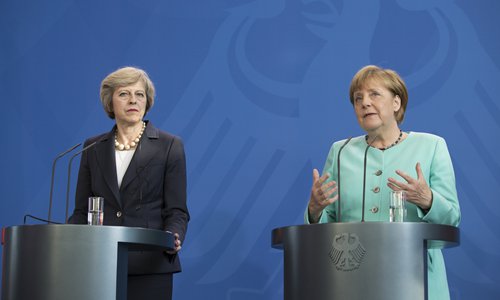Commentaries
Your Present Location: Teacher_Home> Wang Yiwei> CommentariesComplex times favor charismatic leaders with simple solutions
Source: Global Times Published: 2017-7-4

British Prime Minister Theresa May (left) and German Chancellor Angela Merkel Photo: CFP
British Prime Minister Theresa May has finally secured a deal with the Northern Irish Democratic Unionist Party (DUP), at a cost of spending 1.5 billion pounds ($1.94 billion) over the next two years on infrastructure, health and education in Northern Ireland.
The Tories` pact with the DUP looks like a deal to prop up this minority government for the two years, which in theory is necessary to deliver Brexit.
On April 18, May called for a snap general election in the hope of winning a landslide victory and strengthening her hand in negotiations with the European Union, with Conservative party leading 24 points ahead of Labour in the polls.
However, within six weeks time, the Conservatives lost the majority they had.
Succeeding David Cameron because she was seen as a trustworthy figure who could make serious decisions in troubled times, May was no longer looking all that "strong and stable."
In times of great change, people look for perspective and guidance.
As Wang Yiwei, director of the Institute of International Affairs, Renmin University of China, told the Global Times in May, a strong leader with personality is needed to bring real change when a society is facing complex challenges with a downturned economy.
Strong leaders wanted in Europe.
Not only does Britain need a strong leader, most Europeans believe their countries need strong leaders who are "prepared to change the rules of the game," according to a report by French newspaper Ouest-France earlier this year.
The report cited a recent study published by Ipsos Global Advisor, which revealed widespread mistrust of governments and international institutions.
The study focused mainly on five European countries: France, Spain, Italy, Germany and the UK.
Established political figures have failed to serve ordinary people`s interests, thus a majority of respondents said they believe their countries need strong leaders to set it back on the right track (72 percent in Spain, 70 percent in France, 67 percent in Italy and the UK).
Germany is the only exception, where 34 percent of respondents believed so.
As an article in the Guardian said on March 3, "The problem is not the monopolization or abuse of power by strong leaders. It is a general lack of strong, credible, inclusive leadership of any kind."
Archie Brown, author of The Myth of the Strong Leader: Political Leadership in the Modern Age and emeritus professor of politics at Oxford University, described in an article published by The Washington Post newspaper on February 7 that a strong leader is "One who maximizes his [or her] personal power; dominates his government, political party and a wide swath of public policy; and asserts his right to make all the big decisions."
Kerry Brown, professor of Chinese Studies and director of the Lau China Institute at King`s College London, told the Global Times in May that "Strong leaders are often people who capture the imagination of the public, and engage with their aspirations and desires. They also inspire confidence and trust."
German Chancellor Angela Merkel, the longest-serving leader in the EU, is believed to be the most powerful leader in EU.
Kerry Brown pointed out that although the German chancellorship is constitutionally not a very powerful position, Merkel is a very successful German chancellor with great respect from home and abroad.
"She has been very good at building effective coalitions. This has been her real skill," he said.
Strongman leaders elsewhere
An article by the Financial Times in October 2016 noted that the nationalist "strongman" leader is back in fashion.
Apart from Vladimir Putin of Russia, there are other strongman leaders such as Turkish President Recep Tayyip Erdogan, Hungarian Prime Minister Viktor Orban, Narendra Modi of India and Shinzo Abe of Japan.
Leaders such as Putin and Erdogan promise to lead national revivals that will avenge previous humiliations at the hands of foreigners, according to the report.
US President Donald Trump`s electoral success is also echoed voters` demand for a strong leader and their perception that Trump looked like one.
According to Gallup interviewing conducted in February, the majority of Americans believed Trump keeps his promises, is a strong and decisive leader, and can bring about the changes the country needs.
"These leaders look sound and confident. But it is also about their achievements. For Trump, it is far too early to tell," Kerry Brown told the Global Times. "For Putin and Erdogan, they have maintained power for a reasonable length of time. But they are still in the midst of trying to achieve something."
Kerry Brown believed that really great leaders are "flexible, patient, and often work well with others."
As the world is witnessing the rising trend of "strongman leader," what will be the implications for world politics?
Li Guofu, a researcher at China Institute of International Studies, told the Global Times in May that strongman leaders are chosen by the time they live in.
"Strongman leaders with an assertive approach and strong rhetoric are to safeguard the interests of their country, thus it is difficult to generalize about their impact on social stability," Li said, adding that some are good at maintaining peace, but some might not be.
Wang told the Global Times that this is a time for strong leaders, but the days of the great leader who is expected to know all the answers are gone. He said political leadership in the modern era is multifaceted.
He believed that strong leaders ruling by law would make international political stories more exciting, and the cost of international communications reduced.
Wang Yiwei is a senior fellow of Chongyang Institute for Financial Studies, Renmin University of China.
Key Words: British;German;strong leaders;Wang Yiwei























































































 京公网安备 11010802037854号
京公网安备 11010802037854号





